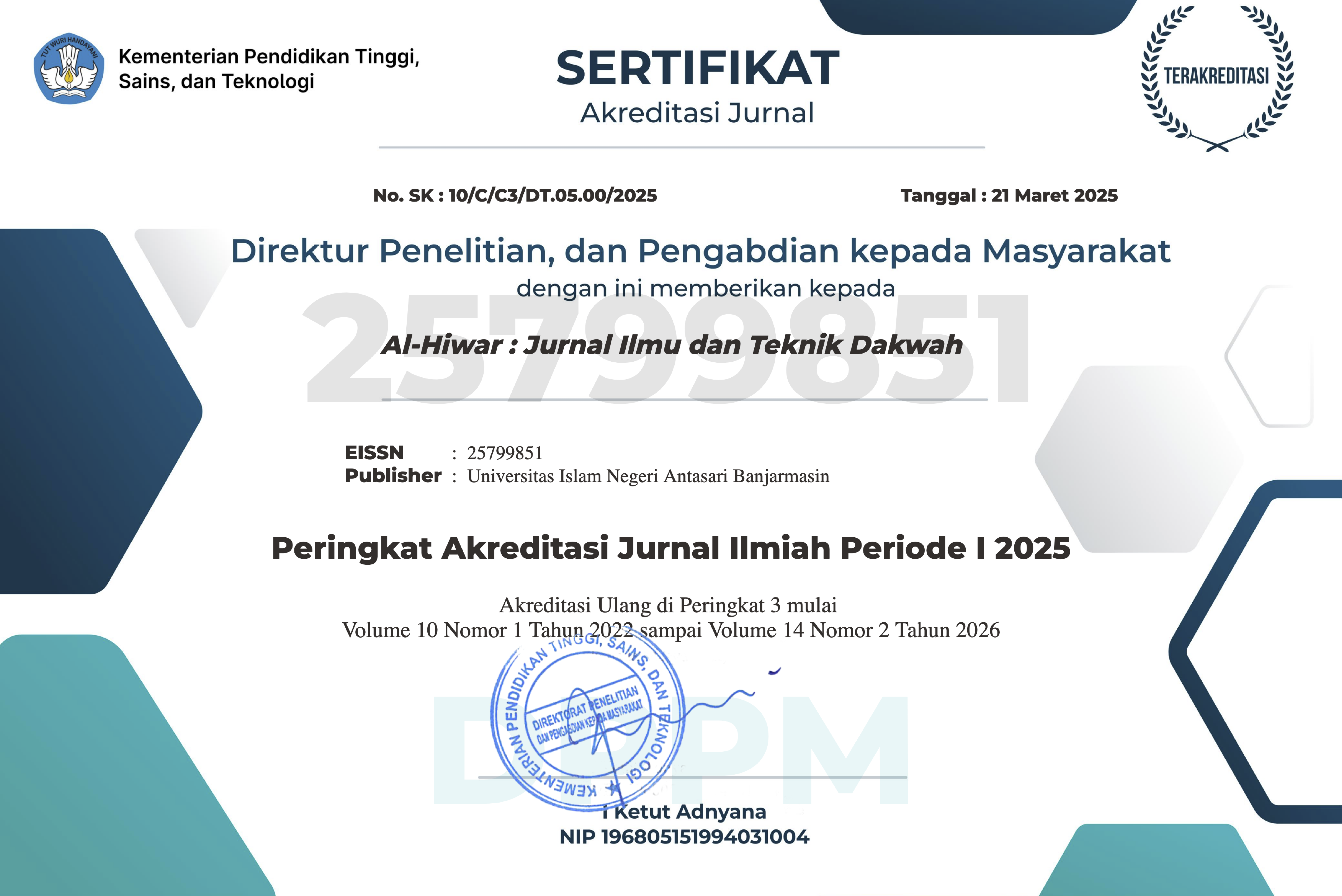Teknik Self-Management: Strategi Mereduksi Gaya Hidup Hedonis Siswa Sekolah Menengah Pertama
DOI:
https://doi.org/10.18592/alhiwar.v11i2.10958Keywords:
hedonic lifestyle, junior high school students, self-management techniquesAbstract
Changes in people's lifestyles are one of the impacts of globalization. Globalization can influence how young people meet the demands of their lifestyle. A hedonistic lifestyle is defined as one that prioritizes pleasure and material satisfaction. Most people believe that lifestyle is important because it can show self-identity. The aim of this article is to explain how effective self-management techniques are in reducing the hedonic lifestyle of students at SMPN 2 Pamekasan with six research subjects. This research uses a one-group pretest-posttest experimental design. The data collection methods used in this research were the hedonic lifestyle scale, observation, and interviews. The data analysis technique used is the Wilcoxon signed rank test. The results of the research show that self-management techniques are effective in reducing the hedonic lifestyle of class IX students at SMPN 2 Pamekasan. This can be seen from the asymptotes. The sig (2-tailed) value has a value of 0.008, which is smaller than 0.05 (Ha is accepted).References
Aria, R., & Archer, N. (2020). An Online Mobile/desktop Application for Supporting Sustainable Chronic Disease Self-Management and Lifestyle Change. Health Informatics Journal, 26(4), 2860–2876.
Atthohiri, M. M., & Saidah, I. (2022). Hubungan tanggung jawab belajar dengan kemandirian siswa di MTs Al-Mukhlishin Galis Pamekasan. DA’WA: Jurnal Bimbingan Penyuluhan & Konseling Islam, 1(2).
Corey, G. (2012). Theory and practice of Counseling and Psychotherapy. . Cengage learning.
Elder, J. P., Ayala, G. X., & H. (1999). Theories and intervention Approaches to Health-Behavior Change in Primary care., 17(4). American Journal of Preventive Medicine, 17(4), 275–284.
Fahmi, J. Z., Ramli, M., & Hidayah, N. (2019). Teknik Self-Management sebagai upaya Mereduksi Gaya Hidup Hedonis Siswa SMA. Jurnal Pendidikan: Teori, Penelitian, Dan Pengembangan, 4(10), 1408–1416.
Fitri, A. D. (2013). Penerapan Strategi Pengelolaan Diri (self-management) untuk Mengurangi Perilaku Konsumtif pada Siswa Kelas X-11 SMAN 15 surabaya. Doctoral dissertation, State University of Surabaya.
Fitri, Q. (2019). Penerapan Pendekatan Konseling Eksistensialis-Humanistik untuk Mengurangi Perilaku Hedonis Siswa di SMAN 10 Makassar. Psychopathic: Jurnal Ilmiah Psikologi, 6(1).
Giddens, A. (2020). Modernity and self-identity: Self and society in the late modern age. (In The new).
Goleman, D. (2000). Kecerdasan Emosional. Gramedia Pustaka Utama.
Mappiare, A. T. (2006). Kamus Istilah Konseling & Terapi.
Muawaliyah, W., & Saifuddin, A. (2023). Consumptive Behavior in Female University Students: Qana’ah and Hedonic Lifestyle as Predictors. Islamic Guidance and Counseling Journal, 6(1), 70–82.
Nadzir, M., & Ingarianti, T. M. (2015). Psychological Meaning of Money dengan Gaya Hidup Hedonis Remaja di Kota Malang. In Seminar Psikologi & Kemanusiaan, 978–979.
Nasution, A. M., Nurbaiti, N., & Harahap, M. I. (2023). The Effect Of Hedonism Lifestyle On Student Consumptive Behavior. FIKROTUNA: Jurnal Pendidikan Dan Manajemen Islam, 17(01).
Nevanda, A. (2022). Pengaruh Penggunaan Pendekatan REBT dalam Konseling Kelompok terhadap Hedonisme Siswa Kelas XI MIA 1 Putri SMA Muhammadiyah 10 Surabaya. . Skripsi Universitas PGRI Adi Buana Surabaya.
Prilyantinasari, P., & Mulyana, A. (2020). The Effect of Instagram Exposure of Ledonic Lifestyle on Dissonance Rates for Digital Native. International Journal of English Literature and Social Sciences (IJELS), 5(2).
Sa’idah, I., Atmoko, A., & Muslihati, M. (2021). Aspirasi Karier Generasi Milenial. Edu Consilium: Jurnal Bimbingan Dan Konseling Pendidikan Islam, 2(1), 62–89.
Sa’idah, I. (2019). Teori dan Teknik Konseling. IAIN Madura Press.
Setianingsih, E. S. (2018). Wabah Gaya Hidup Hedonisme Mengancam Moral Anak. Majalah Ilmiah Pendidikan Dasar, 8(2), 130.
Sholeh, A. (2017). The Relationship Among Hedonistic Lifestyle, Life Satisfaction, and Happiness on College Students. International Journal of Social Science and Humanity, 7(9), 604–607.
Simbolon, S. E. A. (2023). Implications of Lifestyle Hedonism on Psychology Well-Being. Journal of Education Policy Analysis, 1(1), 1–6.
Tirtayasa, S., Nevianda, M., & Syahrial, H. (2020). The Effect of Hedonic Shopping Motivation, Shopping Lifestyle and Fashion Involvement with Impulse Buying. International Journal of Business Economics (IJBE), 2(1), 18–28.
Downloads
Published
How to Cite
Issue
Section
License
Copyright (c) 2023 Ishlakhatus Sa'idah

This work is licensed under a Creative Commons Attribution 4.0 International License.
Authors who publish with this journal agree to the following terms:
- Authors retain copyright and grant the journal right of first publication with the work simultaneously licensed under a Creative Commons Attribution License that allows others to share the work with an acknowledgement of the work's authorship and initial publication in this journal.
- Authors are able to enter into separate, additional contractual arrangements for the non-exclusive distribution of the journal's published version of the work (e.g., post it to an institutional repository or publish it in a book), with an acknowledgement of its initial publication in this journal.
- Authors are permitted and encouraged to post their work online (e.g., in institutional repositories or on their website) prior to and during the submission process, as it can lead to productive exchanges, as well as earlier and greater citation of published work.






